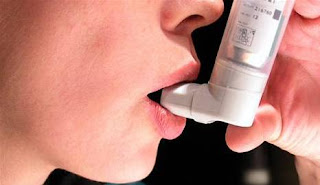Asthma is a disorder in which the muscles surrounding the airways of the lungs become tight and the lining of the air passages swells and airway become narrow, leading to wheezing, shortness of breath, chest tightness, and coughing.
Causes of asthma:
Asthma is thought to be caused by a combination of genetic and environmental factors. You have a 6% chance of having asthma if neither parent has the condition, a 30% chance if one parent has it, and a 70% chance if both parents have it. Asthma is not contagious. In children between the ages of 3–14, a positive skin test for allergies and an increase in immunoglobulin E increases the chance of having asthma.
According to the estimates of the American Thoracic Society (2004), 15–23% of new-onset asthma cases in adults are work related.
A study monitoring workplace asthma by occupation, found that the highest percentage of cases occurred among operators, fabricators, and laborers. Most cases were associated with the manufacturing and services industries.
Asthma symptoms can be triggered by breathing in allergy-causing substances (called allergens or triggers). Major asthma triggers are:
Dust
Animals (pet hair or dander)
Changes in weather (most often cold weather)
Respiratory infections, such as the common cold
Tobacco smoke
Pollen
Chemicals in the air or in food
Strong emotions (stress)
Symptoms of asthma:
Common symptoms of asthma include wheezing, shortness of breath, chest tightness and coughing, and use of accessory muscle. Symptoms are often worse at night or in the early morning, or in response to exercise or cold air. Some people with asthma rarely experiences symptoms, usually in response to triggers, whereas other may have marked persistent airflow obstruction.
Gastro-esophageal reflux disease coexists with asthma in 80% of people with asthma, with similar symptoms. Various theories say that asthma could facilitate GERD and/or vice versa.
Early warning signs may start before the well-known symptoms of asthma and are the earliest signs that your asthma is worsening.
Early warning signs include:
li>Frequent cough, especially at night
Losing your breath easily or shortness of breath
li>Signs of a cold or allergies (sneezing, runny nose, cough, nasal congestion, sore throat, and headache)
Wheezing or coughing after exercise
Feeling tired, easily upset, grouchy, or moody
Decreases or changes in lung function as measured on a peak flow meter
ul>p>strong>Treatment of asthma:
The goal of treatment is to avoid the substances that trigger your symptoms and control airway inflammation.
There are two basic kinds of medication for treating asthma:
Control drugs to prevent attacks: Control drugs for asthma control your symptoms if you don't have mild asthma. You must take them every day for them to work. Take them even when you feel okay.
Quick-relief drugs for use during attacks: Quick-relief drugs work fast to control asthma symptoms. You take them when you are coughing, wheezing, having trouble breathing, or having an asthma attack. They are also called "rescue" drugs.
Know which triggers make your asthma worse and what to do when this happens
RAMMIDAS SEO
Causes of asthma:
Asthma is thought to be caused by a combination of genetic and environmental factors. You have a 6% chance of having asthma if neither parent has the condition, a 30% chance if one parent has it, and a 70% chance if both parents have it. Asthma is not contagious. In children between the ages of 3–14, a positive skin test for allergies and an increase in immunoglobulin E increases the chance of having asthma.
According to the estimates of the American Thoracic Society (2004), 15–23% of new-onset asthma cases in adults are work related.
A study monitoring workplace asthma by occupation, found that the highest percentage of cases occurred among operators, fabricators, and laborers. Most cases were associated with the manufacturing and services industries.
Asthma symptoms can be triggered by breathing in allergy-causing substances (called allergens or triggers). Major asthma triggers are:
Dust
Animals (pet hair or dander)
Changes in weather (most often cold weather)
Respiratory infections, such as the common cold
Tobacco smoke
Pollen
Chemicals in the air or in food
Strong emotions (stress)
Symptoms of asthma:
Common symptoms of asthma include wheezing, shortness of breath, chest tightness and coughing, and use of accessory muscle. Symptoms are often worse at night or in the early morning, or in response to exercise or cold air. Some people with asthma rarely experiences symptoms, usually in response to triggers, whereas other may have marked persistent airflow obstruction.
Gastro-esophageal reflux disease coexists with asthma in 80% of people with asthma, with similar symptoms. Various theories say that asthma could facilitate GERD and/or vice versa.
Early warning signs may start before the well-known symptoms of asthma and are the earliest signs that your asthma is worsening.
Early warning signs include:
li>Frequent cough, especially at night
Losing your breath easily or shortness of breath
li>Signs of a cold or allergies (sneezing, runny nose, cough, nasal congestion, sore throat, and headache)
Wheezing or coughing after exercise
Feeling tired, easily upset, grouchy, or moody
Decreases or changes in lung function as measured on a peak flow meter
ul>p>strong>Treatment of asthma:
The goal of treatment is to avoid the substances that trigger your symptoms and control airway inflammation.
There are two basic kinds of medication for treating asthma:
Control drugs to prevent attacks: Control drugs for asthma control your symptoms if you don't have mild asthma. You must take them every day for them to work. Take them even when you feel okay.
Quick-relief drugs for use during attacks: Quick-relief drugs work fast to control asthma symptoms. You take them when you are coughing, wheezing, having trouble breathing, or having an asthma attack. They are also called "rescue" drugs.
Know which triggers make your asthma worse and what to do when this happens
RAMMIDAS SEO
